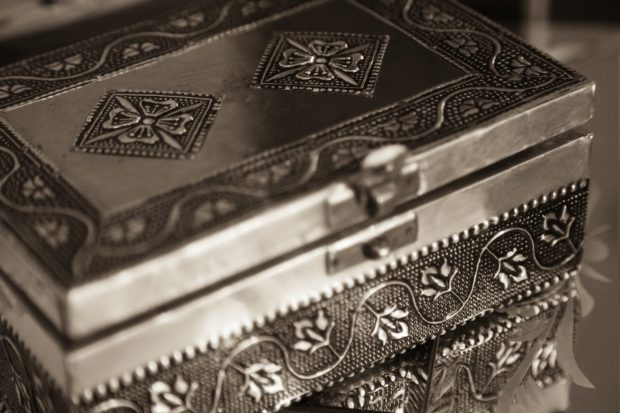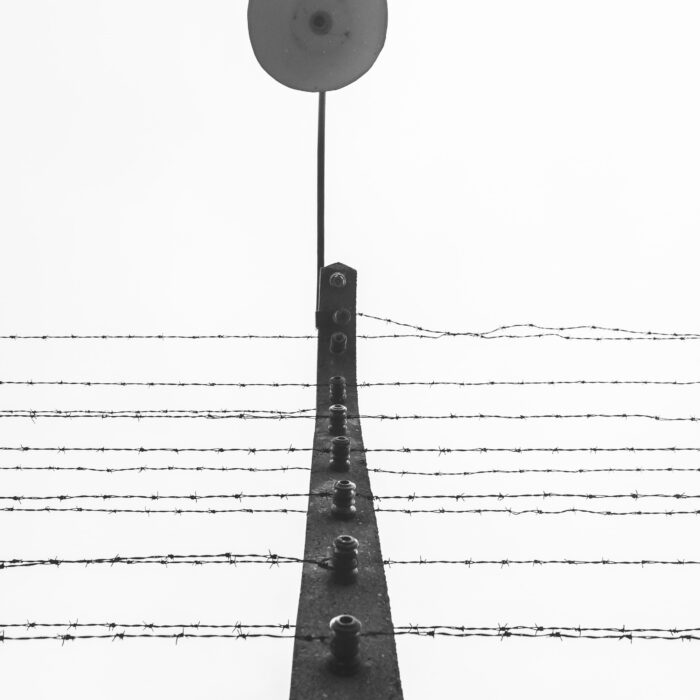You have no items in your cart. Want to get some nice things?
Go shopping
When Ameera was four, Dadi Ammi bought her a jewelry box. It was the size of a small shoebox. On its front was a pair of pink daisies and a latch that locked with a soft click.
“It’s for keeping special things safe,” Dadi Ammi explained. “When you get your ears pierced, we can put all your earrings here.”
But as Ameera darted around the garden, the only thing that pierced her ears was the wind. On most days, she chased crows around the backyard, longing to feel their wings. On other days, she drew her own crows on the sidewalk, chalk carving out what remained beyond reach.
Indoors, the jewelry box collected dust, empty and forgotten.
One Sunday morning, Ameera watched Dada Abbu buff wax onto his car. The smell of his car polish tugged her away from the crows. It prickled her nose, like the bubbles in a bottle of Fanta. Dada Abbu stood in front of his Corolla in his brown shalwar kameez. He dipped a yellow rag into a plastic tub and rubbed the wax onto the bonnet in circular motions. His fingers moved with certainty as he drew swirls of polish. Next Sunday, when Dada Abbu came outside, Ameera was waiting for him, a yellow rag in little hands. She followed him around, mimicking his practiced movements, chasing his certainty.
At night before bed, Ameera pulled down the jewelry box from her bookshelf. She folded the stained yellow rag to fit and placed it inside.
#
Ameera was five when Dadi Ammi first told her about the trains. She had been sitting on Dada Abbu’s lap one August evening as he watched the news. They were showing a black and white video of a man with a pointed hat on his head. He was standing in front of a crescent moon and telling a large group of people something. Ameera decided he must be someone important because when he was done talking everyone cheered. But then his image disappeared from the screen and Ameera saw the trains. They took over the entire television with their compartments. Men with heads wrapped in white cloth hung from the sides and huddled on top. The rust brown cars reminded her of matchboxes. Some of them were even on fire.
Ameera looked up at Dada Abbu. The lines around his mouth had deepened like someone had traced them with a marker. His eyes were fixed on the television.
“Dada Abbu, why are there so many people on that train?” Ameera asked.
Dada Abbu’s eyes snapped to hers. He grabbed the television remote and changed the channel until Sesame Street dubbed in Urdu blared from the screen.
Later that night, after Dada Abbu had gone to sleep, Dadi Ammi told Ameera about the trains. They sat cross legged on the bed. The room was dark but a sliver of light from the hallway snuck through the door. It trickled over Dadi Ammi’s white dupatta, playing with the shadows on her face. And in that haunting glow, Dadi Ammi began her story. She told Ameera about a land from a long time ago; an empire with a queen and a palace just like Ameera’s fairytales. Dada Abbu had grown up in this land, in a city called Delhi. When he turned eighteen, it was time for the queen to leave her empire. But before she left, the man with the pointed hat on television began asking for the land to be divided in two. He and many other people wanted their own land. So, the queen split the empire into two and ran away. It was in those trains that Dada Abbu and his family came to live in a new country with the man in the pointed hat.
“But the trains were on fire, Dadi Ammi.” Ameera was puzzled. “Was Dada Abbu’s train on fire too?”
“I don’t know, meri jaan,” Dadi Ammi replied. “It was a long time ago.”
Soon, the story about the trains became one of Ameera’s favorites. She asked Dadi Ammi to tell it again and again. Dadi Ammi did, rocking back and forth, her white dupatta playing hide and seek with the hallway light. Most of the time, she talked about the way the empire was split or why so many people agreed with the man in the pointed hat. But sometimes, when Ameera pressed her with question after question, she described the trains. Every time she did, her voice dropped to a hush so low that Ameera held her breath, afraid an exhale would blow the words away. She clung to every word. She pictured her Dada Abbu living in a fairytale kingdom with a queen and a man with a pointed hat. But her imagination deserted her when Dadi Ammi spoke about the trains. Try as she might, she could not see Dada Abbu on them.
Dadi Ammi ended every story about the trains the same way. “You must never ask Dada Abbu about the trains, meri jaan,” she would warn. “He doesn’t like to talk about them.”
The day after Ameera heard the story for the first time, she drew an empire in chalk on the sidewalk. Crowning herself queen, she paraded around the amorphous shape next to the garden. “By my royal command, I will split you in two!” she declared. But Ameera wasn’t sure where to draw the partition. Her chalk hung in the air but never came down.
#
Ameera couldn’t ask Dada Abbu about the trains, so she asked him about fruits instead. Dada Abbu was something of a fruit connoisseur. At any given point in the year, he could tell you what was in season, what was going out of season, and where to buy the best variety at the best prices. Once a week, he walked to the bazaar to buy fruits for the house. On those days, the dining table hid under bags of produce handpicked by him and sweetness cut through the air.
At the age of seven, Ameera committed herself to learning about fruits. Uninspired by the verses from her Quran class, she decided to memorize fruit seasons instead. It became her favorite game at the dining table. She sat across Dada Abbu and summoned the self-assurance of her Quran teacher. Her voice chimed off the walls of the dining room as she recited the fruits that were in season and asked him what was coming next.
“Apricots, peaches, cherries, plums…what’s next Dada Abbu?”
“Grapes,” he replied.
The day Ameera correctly predicted that grapes were next in line, Dada Abbu looked up at her from the head of the table, beaming. A week later, he came home clutching bags full of bright green bunches and a blue packet of chips.
That evening, an empty chips packet joined the yellow rag in the jewelry box.
#
By the time Ameera turned ten, she had stopped reading fairy tales and started living them instead. She built herself an empire of bits and baubles. Her jewelry box overflowed with stick-on earrings and friendship bracelets. The drawers of her desk were littered with faded newspaper clippings and old birthday cards. Entire baskets full of handmade lanyards replaced the sidewalk chalk. Ameera was a magpie queen, reigning over her treasures.
And then, one Saturday morning, Ameera and Dadi Ammi discovered gold.
Dadi Ammi was cleaning the closet in her living room. It was built into the walls, encased in the warp and weft of the house. Its wooden panels grazed the ceiling, and it was near the top that Dadi Ammi discovered a hidden alcove full of gold jewelry.
Ameera came down to an array of pendants and jhumkas, bangles and maalas, laid out on the dining table. She peered over Dadi Ammi’s shoulder. Her eyes took in the dull gold jewels, catching the pricks of brilliant burnish poking through.
“Whose jewelry is this, Dadi Ammi?” Ameera asked.
Dadi Ammi took in a deep breath and held onto it. Her eyes were fixed on her husband. Dada Abbu sat at the opposite end of the table, sprinkling black pepper over his orange wedges. He did not look up.
“They belong to the people who lived here before us,” she said in a low voice.
Ameera’s face scrunched in confusion. “But Dadi Ammi, we’ve always lived in this house.”
Dadi Ammi’s fingers stroked the pendant nearest to her. One by one, she picked up the delicate pieces and wrapped them in an old bedsheet. She carried the makeshift parcel into her bedroom, placed it on the bed and stared at it. Ameera hung in the doorway, Dadi Ammi’s back turned towards her.
“Dadi Ammi, where did those people go?” she prodded hesitantly.
“On the trains,” Dadi Ammi replied. She did not turn around.
Back in her bedroom, Ameera placed her jewelry box on her bed and mirrored Dadi Ammi’s wistful stare. Her fingers pried open the metal latch to reveal the trivial treasures buried within. Ameera imagined a different time where a different girl with a different Dadi Ammi and Dada Abbu and a different jewelry box lived in this house. She imagined her jewelry box full of the dull gold jewels Dadi Ammi had found. She imagined leaving her house on the trains. She imagined taking everything with her. She imagined leaving everything behind.
#
When Ameera turned fifteen, Dadi Ammi bought her a diary. It came with a padlock and a set of keys smaller than Ameera’s pinky finger.
“This way you can keep your words safe too,” said Dadi Ammi.
Soon, the pages of Ameera’s diary filled with words. She wrote down the lilting cries of neighborhood hawkers, the things Baba yelled during cricket matches, the lyrics to her favorite Taylor Swift songs. All the gems in her jewelry box were now made of ink.
But the ink dried anytime she tried writing about Dada Abbu. In school, Ameera read pages of Shakespeare. Nose in her textbook, she listened to characters handing out their innermost thoughts like cheap commodities. At home, the only soliloquies she heard were the beating sounds of Dada Abbu’s presence around the house; the slight shuffle of his flip flops while he walked in the garden, the soft click of the front door before he left for prayers, the clarifying rasp of his throat as he drank his evening coffee. There were no words beyond respectful salaams and occasional kisses on the back of Ameera’s hand. Ameera didn’t know how to save those.
On the evening of Dada Abbu’s birthday, everyone gathered around the dining table. Dada Abbu sat at its head, dressed in a white shalwar kameez for Asr prayers. His fingers trembled slightly as he lifted a mug of coffee to his lips. Ameera settled herself next to him. Dada Abbu raised his mug to his lips once more. A drop of coffee sloshed onto his kameez as his fingers shook. They both watched as a stain bloomed on the carefully starched material. They both pretended not to notice.
Dadi Ammi entered the dining room carrying a cake already portioned into even slices. The clinking of plates filled the room. Ameera looked at her grandfather. His head hung low, bushy eyebrows tucked into the furrows of his forehead. The thinning bald patch on the center of his head caught the light, making his hair almost translucent. His finger traced the now dried coffee stain on his kameez. Ameera felt as if the blot was there to stay, part of the wordless rhythm they were building.
#
Rhythms change. Ameera knew this. In her diary, she recorded the quickening pulse of a hummingbird taking flight, the lagging tempo of a falling kite, the alternating beat of applause. But her and Dada Abbu’s rhythm had become a held note.
Tangled in its unrelenting stretch, Ameera turned to Dadi Ammi for release. They spent many afternoons together, Ameera leaning against the kitchen door, Dadi Ammi animating the stove. And with the steady cadence of her stirring spoon, Dadi Ammi became the guiding meter of their offbeat song. They spoke about Ameera’s A Levels and discussed Dadi Ammi’s favorite television serials. But, after fifty years of marriage, Dadi Ammi always circled around to talk about Dada Abbu. In her cloud of spices, she described what she was making for his lunch, lamented his growing vegetarianism, and asked Ameera if she would please pull out the steel dishes he ate in. Ameera did, crouching low to reach into the cabinets in the dining room. Dull grey and slightly rough to the touch, the steel dishes were the only thing Dada Abbu’s food was served in. His mother had brought them with her on the trains, Dadi Ammi told Ameera one afternoon. They had collected dents from years of use ever since. Every day, at 2pm sharp, Dadi Ammi presented one in front of him, filled with a vegetarian dish of his choosing. His trembling fingers grasped a matching dull gray spoon as he scooped the sabzi onto his plate. Ameera pictured the dishes on the bustling trains, the clang of steel on steel, rattling their way to this table.
At the age of eighteen, Ameera watched Dada Abbu vomit into the same steel pot.
Dadi Ammi had summoned everyone downstairs, her voice frantic on the phone.
“He is not doing well,” were her only words.
Ameera heard the heaving from the staircase. From the edge of her grandparents’ living room, she watched as Dadi Ammi held the dish that typically contained her culinary magic up to Dada Abbu’s mouth. His face was unrecognizable. Bushy eyebrows dissolved into lines of tension. A deep rasp emerged from his throat as he hunched over the bowl, coughing up vomit and mucus and blood. He had been throwing up uncontrollably. The bowl had been the only thing in arm’s reach.
Ameera’s parents assessed the scene with a resolve only their medical degrees could provide. Mama left to go through the medicine cabinet. Baba called his colleague to confer. But Ameera hovered in the corner. She listened to Dadi Ammi softly shushing as she stroked Dada Abbu’s back and hung onto the deep rattling monologue of sickness.
#
Ameera was twenty-one when Dada Abbu was wheeled into surgery.
Initially, there were talks of routine procedures and assurances of short hospital stays. They were followed by side effects from medications and unforeseen complications with his breathing. When he finally came home, two weeks later than expected, it was with a squeaky wheelchair and a prolonged recovery ahead. In the months and years that followed, Dada Abbu and Dadi Ammi’s living space was transformed into an extension of the hospital ward. The dining table was cleared to house rows of thermometers, supplements, and medications. Furniture was removed to make space for a walker. Chairs were placed strategically around the house so they were never out of reach. Nurses and physiotherapists cycled in and out and in and out. Everything was put in place to help Dada Abbu restore his life to what it had once been. But bodies, Ameera soon learned, are one-way trains with no return.
Sickness brought its own unsettling harmony. The shuffling of flip flops and clicking of doors came to an abrupt halt. Instead, Dadi Ammi’s spoon stirred to the beep of blood pressure monitors. Now, as Ameera leaned against the kitchen door, Dadi Ammi described Dada Abbu’s medication dosages, lamented the growing side effects, and asked Ameera if she would please go out and buy more adult diapers. And for the first time, Ameera had words to write down: Levodopa, hemodialysis, Canped adult pants. The ink flowed, heavy and thick.
Dada Abbu had been sleeping in the guest bedroom since the surgery. It was the only room downstairs with doors big enough for a walker to fit through. The side door opened into the hallway and when Ameera stood behind the pillar nearest to it, she could see Dada Abbu’s feet propped up on a pillow in bed. It became her vantage point. Every evening, when Dadi Ammi lay down for a nap, she paused in the hallway to catch a glimpse of Dada Abbu. He was almost always lying down. The ceiling fan whirred above him. Ameera counted the slow rounds of its blades. One round, two rounds, three…until they melted into a wheel endlessly spinning around.
One evening, as Ameera hung in the hallway, she heard a familiar rasp. She approached the bed, her feet wavering with each step. Dada Abbu was awake but his pills had left him untethered. His eyes evaded her, fixed on what she could not see. He coughed again and Ameera moved to adjust his pillow the way she had often seen Dadi Ammi do. She allowed herself a faint whisper of a touch against the back of Dada Abbu’s head, applying just enough pressure to keep it upright as she propped up his pillow. Even then, she could feel the prickle of his hair on her fingertips and the slight greasiness of his scalp where he had been balding. As she lay his head back down, his eyes found hers and flickered with recognition. His swollen fingers grasped Ameera’s hand and squeezed.
“I carried you around in my lap the most,” he said.
And Ameera felt his certain fingers, saw his beaming smile, and held her most precious jewels one last time.
#
It was a Friday afternoon. Outside, cars idled in the lull before Jumma prayers. Inside, Ameera stood by the kitchen as Dadi Ammi prepared soup for Dada Abbu’s lunch. It was the only thing she could still persuade down his throat. Her spoon swam streams in the pot. She poured the soup into a bowl and left the kitchen to check on her husband. Ameera stayed, tracing the wisps of steam with her eyes. They grew thinner and thinner, but Dadi Ammi did not return. Ameera made her way to her hallway vantage point and heard Dada Abbu’s gasping wheeze, Dadi Ammi’s voice laced with alarm, desperate steps on the staircase, the complaining creak of a wheelchair, someone calling her name, the wail of an ambulance siren, already in mourning, the pressing whispers of adults, the demanding ringing of mobile phones, hiccuping sobs, and then, the deafening silence of a held note finally being released.
On the kitchen counter sat the bowl of soup, now cold to the touch.
#
When Ameera was five, Dadi Ammi weaved a fairytale with a haunting glow. Through the sparse threads of matchbox trains and pointed hats, she told Ameera a story about Dada Abbu’s past.
But when Ameera turned twenty-four, Dada Abbu was no more. Ameera sat cross-legged on her bed with her own collection of loose threads. They were latched in a pink jewelry box, in rhythms silent and loud. They spoke in moments when words failed. They endured when bodies withered. So, with her mixed bag of trinkets, Ameera began her own story.

Haniya Habib
Haniya Habib was born and raised in Karachi, Pakistan and is currently a graduate student in Near Eastern Studies at New York University.




